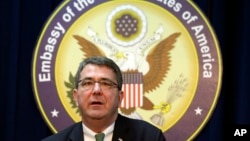SEOUL —
A top U.S. defense official is visiting South Korea, where he says North Korea's recent provocations are only further isolating Pyongyang from the rest of the world.
Deputy Defense Secretary Ashton Carter said Pyongyang's missile and nuclear tests, as well as recent threats to launch a nuclear strike and attack frontier islands in the South, are not going to soften attitudes abroad towards the reclusive and impoverished country.
"If the North Koreans think this kind of thing is going to get them anywhere, they're mistaken. The only effect it's having is to bring upon North Korea the opprobrium [reproach] of the entire world," Carter said.
In response, he added, the United States military is continuing to integrate operations with South Korean forces and adding ground-based interceptors to U.S. missile defenses in Alaska.
China on Monday cautioned the United States to act prudently on boosting its anti-missile system. A spokesman for the foreign ministry in Beijing, Hong Lei, told reporters such plans, in response to North Korea's provocation, “will intensify antagonism and will not be beneficial to finding a solution for the problem.” The spokesman said the situation is best addressed through diplomatic means.
VOA asked Carter if South Korean government and defense officials he met Monday are alarmed by the recent North Korean rhetoric or do they view it as similar to Pyongyang’s more typical bellicose rhetoric?
"I found that my colleagues in the South Korean government shared our assessment," Carter said. "After all we have a common foundation of intelligence about North Korea and so we see things the same way."
Joint military drills are underway on the peninsula (Foal Eagle and Key Resolve) involving thousands of members of forces from both the United States and South Korea.
Carter also underscored that all resources under America's nuclear umbrella will continue to be available to South Korea. He says an example of this will be a Tuesday “training flight” of a B-52 bomber near the peninsula.
It is unusual for such flights to be announced in advance or specifically referenced by a high-ranking official. Carter did not say whether the bomber would be armed.
After the deputy defense secretary's announcement, a U.S. military spokesman said the flight will likely originate at Anderson Air Force Base on the Pacific island of Guam.
Pentagon officials earlier confirmed that a B-52 Stratofortress also performed a "routine continuous bomber presence mission" on March 8th near the Korean peninsula.
Carter is reassuring allies in the region that the automatic U.S. government budget cuts which kicked in March 1 (known as sequestration) will not affect operations of the U.S. military in the Asia-Pacific region.
The defense official's visit to South Korea was the second stop on a trip to Asia that includes Japan, the Philippines and Indonesia.
Deputy Defense Secretary Ashton Carter said Pyongyang's missile and nuclear tests, as well as recent threats to launch a nuclear strike and attack frontier islands in the South, are not going to soften attitudes abroad towards the reclusive and impoverished country.
"If the North Koreans think this kind of thing is going to get them anywhere, they're mistaken. The only effect it's having is to bring upon North Korea the opprobrium [reproach] of the entire world," Carter said.
In response, he added, the United States military is continuing to integrate operations with South Korean forces and adding ground-based interceptors to U.S. missile defenses in Alaska.
China on Monday cautioned the United States to act prudently on boosting its anti-missile system. A spokesman for the foreign ministry in Beijing, Hong Lei, told reporters such plans, in response to North Korea's provocation, “will intensify antagonism and will not be beneficial to finding a solution for the problem.” The spokesman said the situation is best addressed through diplomatic means.
VOA asked Carter if South Korean government and defense officials he met Monday are alarmed by the recent North Korean rhetoric or do they view it as similar to Pyongyang’s more typical bellicose rhetoric?
"I found that my colleagues in the South Korean government shared our assessment," Carter said. "After all we have a common foundation of intelligence about North Korea and so we see things the same way."
Joint military drills are underway on the peninsula (Foal Eagle and Key Resolve) involving thousands of members of forces from both the United States and South Korea.
Carter also underscored that all resources under America's nuclear umbrella will continue to be available to South Korea. He says an example of this will be a Tuesday “training flight” of a B-52 bomber near the peninsula.
It is unusual for such flights to be announced in advance or specifically referenced by a high-ranking official. Carter did not say whether the bomber would be armed.
After the deputy defense secretary's announcement, a U.S. military spokesman said the flight will likely originate at Anderson Air Force Base on the Pacific island of Guam.
Pentagon officials earlier confirmed that a B-52 Stratofortress also performed a "routine continuous bomber presence mission" on March 8th near the Korean peninsula.
Carter is reassuring allies in the region that the automatic U.S. government budget cuts which kicked in March 1 (known as sequestration) will not affect operations of the U.S. military in the Asia-Pacific region.
The defense official's visit to South Korea was the second stop on a trip to Asia that includes Japan, the Philippines and Indonesia.












